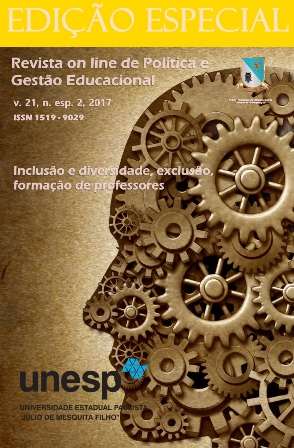Bilingual schools for deaf in brazil: a fight to be won
DOI:
https://doi.org/10.22633/rpge.v21.n.esp2.2017.10172Keywords:
Bilingualism. LIBRAS (Brazilian sign language). Schools. Education.Abstract
This paper has the educational development of deaf community as main subject through its fights and as main objective to emphasize the importance of bilingual schools installation in Brazil. Theoretical background has been took from authors like Kyle (1999), Quadros (2009, 2004), Skliar (1997) and others. This study is a qualitative approach like a reflexive literature review, made since of readings and deepening in current literature about the theme, between January and May 2017. Results show that scholar institutions must adapt themselves in order to increase the educational valorization of the deaf, to increase their cognitive, social and intellectual development. Bilingual schools prioritize the Brazilian Sign Language (BSL) as primary language and the written Portuguese as the second language to the deaf students. Unlike the inclusive schools that insert deaf students among listeners students in a mixed classroom where the primary language is the Portuguese and the second one is BSL, and the interpreter becomes the mediator between the deaf student and the others, hindering the learning of the deaf. It is considered that bilingual schools are able to prepare their students to life through structured teaching based on the sign language, from the use of the language properties of the BSL, facilitating the development and learning of the deaf student in the classroom.
Downloads
References
BRASIL. Decreto n. 5.626, de 22 de dezembro de 2005. Regulamenta a lei de acessibilidade, n° 10.098/2000 e a lei de libras, n° 10.426. Diário Oficial da República Federativa do Brasil. Brasília, 22 dez. 2005.
BRITO, L. F. Integração social & educação de surdos. Rio de Janeiro: Babel, 1993.
JOKINEN, Markku. Alguns pontos de vista sobre a educação dos surdos nos países nórdicos. In: SKLIAR, Carlos (Org.). Atualidade da Educação Bilíngue para Surdos. Processos e projetos pedagógicos. Vol. 1. Porto Alegre: Mediação, 1999.
KYLE, Jim. O ambiente bilíngue: alguns comentários sobre o desenvolvimento do bilinguismo para os surdos. In: SKLIAR, Carlos (Org.). Atualidade da Educação Bilíngue para Surdos. Processos e projetos pedagógicos. Vol. 1. Porto Alegre: Mediação, 1999.
LACERDA, C.B.F. Os Processos Dialógicos entre Aluno Surdo e Educador Ouvinte: Examinando a Construção de Conhecimentos. Tese de Doutorado, UNICAMP: Campinas/ São Paulo, p.79, 1996.
QUADROS, R.M. de. Alfabetização e o ensino da língua de sinais. Textura, Canoas n.3 p.54, 2004.
QUADROS, Ronice Muller de (Org.). STUMPF, Marianne Rossi et al. Estudos surdos IV. Petrópolis, RJ: Arara Azul, 2009.
SÁ, Nídia Regina Limeira de. Cultura, Poder e Educação de Surdos. Manaus: Editora da Universidade Federal do Amazonas, 2002.
SKLIAR, C. (Org). A educação para os Surdos entre a Pedagogia Especial e as Políticas para as Diferenças. In: Desafios e Possibilidades na Educação Bilíngue para Surdos. SEE/ INES. Rio de Janeiro: INES, 1997b.
SKLIAR, C. Uma perspectiva sócio-histórica sobre a psicologia e a educação dos surdos. In (org) Educação e exclusão: abordagens sócio antropológicas em educação especial. Porto Alegre: Editora Mediação, 1997.











